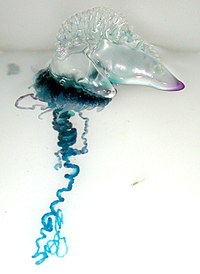
Photo from wikipedia
Background: Sleep deprivation is reported in 80% of patients in the intensive care unit (ICU) and is associated with delirium. Guidelines recommend implementing a sleep-promoting protocol in critically ill patients… Click to show full abstract
Background: Sleep deprivation is reported in 80% of patients in the intensive care unit (ICU) and is associated with delirium. Guidelines recommend implementing a sleep-promoting protocol in critically ill patients which may increase the quantity and quality of sleep and may decrease delirium. Our objective was to implement a pharmacist-led interdisciplinary sleep-promoting protocol and analyze its impact on delirium in ICU patients receiving mechanical ventilation (MV). Methods: The study involved pre-implementation education, protocol development, and post-implementation analysis. ICU pharmacists completed prospective patient chart reviews to reduce exposure to deliriogenic medications and assess the need for a pharmacologic sleep aid. The primary outcome was the incidence of delirium and delirium-free days. Secondary outcomes included ICU length of stay (LOS), incidence of MV, and pharmacist medication interventions. Results: Post-protocol patients (n = 185) had a higher incidence of delirium compared to pre-protocol patients (n = 237) (51.3% vs 39.0%; P = .01). Post-protocol patients had a higher average APACHE III score (P = <.001). Delirium-free days were not significantly different between groups (P = .97). Difference in ICU LOS was not significant (P = .80). More patients received MV post-protocol implementation (55.7% vs 36.1%; P < .001). Pharmacists documented a total of 113 medication interventions. Conclusion and Relevance: A pharmacist-led, ICU sleep-promoting protocol was successfully implemented but did not reduce the incidence of delirium or the administration of insomnia agents. Post-protocol patients had higher disease severity and were more likely to receive MV. Incidence of delirium was consistent with the national reported prevalence of ICU delirium. ICU pharmacists on all shifts had an active role in optimizing sleep.
Journal Title: Journal of pharmacy practice
Year Published: 2023
Link to full text (if available)
Share on Social Media: Sign Up to like & get
recommendations!